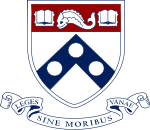Philadelphia Academy
 |
|
| Latin: Universitas Pennsylvaniensis | |
| Motto | Leges sine moribus vanae (Latin) |
|---|---|
|
Motto in English
|
Laws without morals are useless |
| Type | Private |
| Established | 1740 |
| Endowment | $12.2 billion (2017) |
| Budget | $7.74 billion (FY 2016) |
| President | Amy Gutmann |
| Provost | Wendell Pritchett |
|
Academic staff
|
4,645 faculty members |
|
Administrative staff
|
2,500 |
| Students | 24,876 (fall 2015) |
| Undergraduates | 10,406 (fall 2015) |
| Postgraduates | 11,157 (fall 2015) |
| Location | Philadelphia, Pennsylvania, U.S. |
| Campus | Urban, 1,094 acres (4.43 km2) total: 302 acres (1.22 km2), University City campus; 700 acres (2.8 km2), New Bolton Center; 92 acres (0.37 km2), Morris Arboretum |
| Colors | Red and Blue |
| Athletics |
NCAA Division I – Ivy League Philadelphia Big 5 City 6 |
| Nickname | Quakers |
| Affiliations |
AAU COFHE NAICU 568 Group URA |
| Website | www |
 |
|
| University rankings | |
|---|---|
| National | |
| ARWU | 15 |
| Forbes | 7 |
| U.S. News & World Report | 8 |
| Washington Monthly | 5 |
| Global | |
| ARWU | 18 |
| QS | 19 |
| Times | 10 |
| U.S. News & World Report | 14 |
The University of Pennsylvania (commonly known as Penn or UPenn) is a private Ivy League research university located in Philadelphia, Pennsylvania, United States. Incorporated as The Trustees of the University of Pennsylvania, Penn is one of 14 founding members of the Association of American Universities and one of the nine colonial colleges chartered before the American Revolution.
Benjamin Franklin, Penn's founder, advocated an educational program that focused as much on practical education for commerce and public service as on the classics and theology, though his proposed curriculum was never adopted. The university coat of arms features a dolphin on the red chief, adopted directly from the Franklin family's own coat of arms. Penn was one of the first academic institutions to follow a multidisciplinary model pioneered by several European universities, concentrating multiple "faculties" (e.g., theology, classics, medicine) into one institution. It was also home to many other educational innovations. The first school of medicine in North America (Perelman School of Medicine, 1765), the first collegiate business school (Wharton School of Business, 1881) and the first "student union" building and organization (Houston Hall, 1896) were founded at Penn. With an endowment of $10.72 billion (2016), Penn had the seventh largest endowment of all colleges in the United States. All of Penn's schools exhibit very high research activity. In fiscal year 2015, Penn's academic research budget was $851 million, involving more than 4,300 faculty, 1,100 postdoctoral fellows and 5,500 support staff/graduate assistants.
...
Wikipedia
